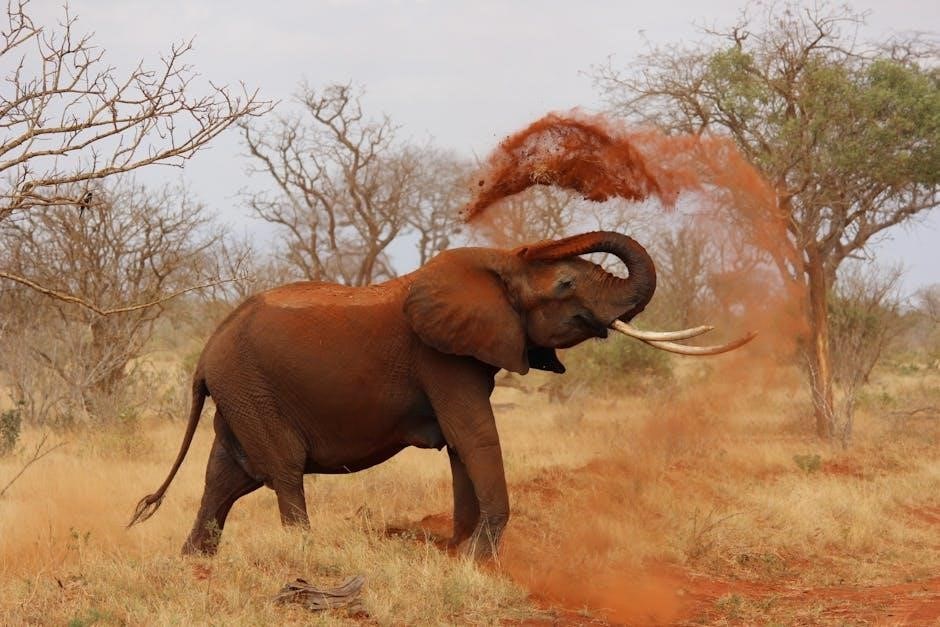George Orwell’s “Shooting an Elephant” is a thought-provoking essay exploring themes of imperialism and moral conflict. The narrator, a British officer in Burma, faces a dilemma when forced to shoot an elephant, highlighting the complexities of colonial rule and personal guilt. This essay is widely regarded as a classic critique of imperialism and is available for download as a PDF for free from various online sources.
Significance of the Essay
“Shooting an Elephant” holds profound significance as a critique of imperialism and human morality. Orwell’s narrative masterfully exposes the psychological and ethical conflicts faced under colonial rule. The essay highlights how societal pressures and fear of judgment can drive individuals to act against their conscience. This timeless piece remains a powerful commentary on authority, guilt, and the complexities of human decision-making. Its availability as a PDF ensures accessibility for readers worldwide, making it a vital resource for understanding Orwell’s perspectives on colonialism and personal responsibility.

Historical Context
Written in 1936, “Shooting an Elephant” reflects George Orwell’s experiences as a British police officer in colonial Burma during the 1920s. The essay captures the tensions of imperialism, where British authority faced growing resistance from the Burmese population. Orwell’s narrative vividly portrays the moral and ethical dilemmas faced by colonial officers, trapped between duty and conscience. The historical backdrop of British colonial rule in Burma provides a critical lens for understanding the essay’s themes of power, oppression, and personal conflict. This context is essential for grasping Orwell’s critique of imperialism and its lasting impact on individuals and society.

Plot Summary
In Shooting an Elephant, a British officer in colonial Burma is pressured to kill an elephant that has rampaged through a village. Reluctant but duty-bound, he shoots the elephant, which dies slowly, leaving him filled with guilt and regret over the unnecessary destruction of life. The incident highlights the moral complexities of colonial authority and personal responsibility.
The Incident with the Elephant
The story begins with the narrator, a British police officer in Burma, receiving reports of an elephant gone rogue. The elephant has destroyed property and killed a local man, prompting villagers to demand action. The narrator, equipped with a rifle, approaches the elephant, which is now calm; Despite his reluctance, he feels pressured by the crowd to shoot; He fires multiple shots, but the elephant dies slowly, causing the narrator deep moral anguish. This incident symbolizes the destructive nature of colonial authority and the ethical dilemmas it imposes.
The Narrator’s Dilemma
The narrator, a British police officer in colonial Burma, faces a moral and ethical conflict when pressured to shoot an elephant that has caused destruction. Despite the elephant’s calm demeanor, the officer feels compelled to act due to the crowd’s expectations, fearing ridicule if he appears weak. This internal struggle highlights the tension between personal morality and societal pressure. The narrator ultimately shoots the elephant, not out of necessity, but to maintain his authority and avoid humiliation, reflecting the broader critique of colonialism and its impact on individuals.

Themes Explored in the Essay
Orwell explores themes of colonialism, imperialism, and moral conflict, highlighting the psychological impact of societal pressure and the tension between power and individual conscience in a oppressive system.
Colonialism and Imperialism
Orwell’s essay critiques the oppressive nature of colonialism and imperialism, exposing the moral corruption and societal pressures faced by British officers in Burma. The narrator, a symbol of the British Empire, is compelled to shoot an elephant to maintain authority, highlighting the absurdity of colonial rule. The elephant’s death serves as a symbolic act of the destructive impact of imperialism, where power is asserted through violence rather than justice. Orwell’s narrative reveals the inherent contradictions and ethical dilemmas embedded in colonial systems, offering a powerful commentary on the human cost of imperialism.
Morality and Guilt
In “Shooting an Elephant,” Orwell explores the moral conflict between personal conviction and societal pressure. The narrator, forced to shoot the elephant to avoid appearing weak, grapples with guilt over killing an animal he believes is valuable. His actions, driven by the crowd’s expectations rather than necessity, reveal the moral ambiguities of colonial rule. Orwell’s essay highlights the psychological toll of imperialism, as the narrator feels trapped by the role imposed on him. The essay, available as a PDF, offers a poignant reflection on the ethical dilemmas faced by individuals in oppressive systems, emphasizing the lasting impact of such choices.
George Orwell’s Background
George Orwell, born Eric Arthur Blair in 1903, was a British writer known for his critiques of imperialism and totalitarianism. His experiences as a police officer in Burma deeply influenced his work, including “Shooting an Elephant.”
His Life and Career
George Orwell, born Eric Arthur Blair in 1903, was a British writer, journalist, and critic. His early life in Motihari, India, and education in England shaped his worldview. Orwell served as a police officer in Burma, experiences that influenced his critique of imperialism. After returning to Europe, he worked as a journalist and writer, publishing works like Down and Out in Paris and London in 1933. His writing often reflected his opposition to totalitarianism and social injustice. Orwell’s legacy includes iconic novels like Animal Farm and 1984, solidifying his role as a literary giant.
His Role as a Police Officer in Burma
During the 1920s, George Orwell served as a police officer in British-ruled Burma, an experience that deeply influenced his writing. His duties often placed him in conflict with local populations, fostering a growing unease with imperialism. His essay “Shooting an Elephant” recounts a pivotal incident where he was pressured to kill an elephant that had rampaged through a village. This event symbolized the moral dilemmas and hypocrisy of colonial authority, a theme Orwell explored to critique the exploitation and oppression inherent in colonial systems. His time in Burma profoundly shaped his anti-imperialist views and literary voice.
Symbolism in the Essay
The elephant symbolizes colonial power and destruction, while the crowd represents societal pressure. Orwell’s internal conflict reflects the moral struggle against imperialism and personal accountability, highlighting the essay’s deeper themes of power, conformity, and guilt.
The Elephant as a Symbol
The elephant in Orwell’s essay symbolizes colonial power and its destructive nature. Its rampage through the village mirrors the chaos of imperialism, while its death represents the inevitable collapse of such systems. The elephant, valued by the village owner, also embodies economic exploitation under colonial rule. The narrator’s reluctance to shoot it, despite pressure from the crowd, highlights the moral conflict between individual conscience and societal expectations. Through the elephant, Orwell critiques the brutality and hypocrisy of colonialism, using it as a powerful metaphor for the destructive forces of imperial dominance.
The Crowd’s Influence
The crowd plays a pivotal role in Orwell’s essay, exerting immense psychological pressure on the narrator. Their presence forces him to act against his conscience, fearing ridicule and loss of authority. The crowd’s expectations symbolize the oppressive weight of societal judgment, driving the narrator to shoot the elephant despite his reluctance. This moment underscores the theme of human behavior under scrutiny, where fear of embarrassment and desire for approval override moral judgment. The crowd’s influence serves as a critique of imperialism, highlighting how collective expectations can lead individuals to act immorally, reinforcing systemic oppression.

Literary Style and Technique
Orwell’s prose is clear and direct, enhancing the essay’s emotional impact. His first-person narrative creates immediacy, drawing readers into the narrator’s moral struggle. The essay’s irony and foreshadowing underscore the complexities of imperialism and personal guilt, making it a masterful critique of colonialism.
Orwell’s Narrative Voice
Orwell’s narrative voice in “Shooting an Elephant” is introspective and personal, drawing readers into his moral and ethical dilemmas. His first-person account creates immediacy, making the reader witness to his internal conflict. The voice is both reflective and critical, revealing the complexities of colonialism and the narrator’s role within it. Orwell’s tone is plainspoken yet profound, blending descriptive detail with philosophical insight. This narrative style enhances the essay’s emotional and thematic depth, allowing readers to connect with the narrator’s struggle between personal morality and societal expectations.
Use of Irony and Foreshadowing
Orwell masterfully employs irony and foreshadowing in “Shooting an Elephant” to highlight the absurdities of colonialism. The narrator’s reluctance to shoot the elephant contrasts ironically with the crowd’s expectation of authority, underscoring the moral paradox. Foreshadowing is evident when the narrator describes the elephant’s calm demeanor, hinting at the tragic inevitability of its death. Orwell’s use of these literary devices deepens the essay’s exploration of imperialism’s moral complexities and the narrator’s internal conflict, creating a layered narrative that resonates with readers long after the story concludes.
Impact and Legacy
“Shooting an Elephant” remains a timeless critique of colonialism and human morality, widely studied for its profound insights. Its availability as a PDF ensures ongoing relevance, inspiring discussions on imperialism’s ethical dilemmas across generations.

Reception and Criticism
George Orwell’s “Shooting an Elephant” has been widely acclaimed for its vivid portrayal of colonialism and moral conflict. Critics praise its nuanced exploration of imperialism’s psychological toll. The essay’s availability as a PDF has made it accessible to global readers, fostering discussions on its themes. While some view it as a powerful anti-colonial statement, others criticize its potential exaggeration of events. Nonetheless, it remains a cornerstone of literary analysis, offering timeless insights into the complexities of power and morality.
Modern Relevance
George Orwell’s “Shooting an Elephant” retains its modern relevance through its exploration of imperialism, moral conflict, and the dangers of unchecked authority. The essay’s themes of power dynamics and societal expectations continue to resonate, offering insights into contemporary issues like systemic oppression and moral accountability. Its availability as a PDF ensures accessibility for new generations, making it a vital resource for understanding the legacy of colonialism and its impact on individual conscience. Orwell’s work remains a powerful critique of human behavior and societal structures, enduring as a timeless commentary on justice and morality.

Downloading “Shooting an Elephant” as a PDF
“Shooting an Elephant” by George Orwell is available for free download in PDF format from various online platforms, including academic databases and literary archives.
Available Formats and Sources
The essay “Shooting an Elephant” by George Orwell is available in multiple formats, including PDF, EPUB, and FB2. It can be downloaded for free from various sources such as academic databases, literary archives, and online libraries. Platforms like Google Books, Project Gutenberg, and educational websites offer easy access to the text. Additionally, the essay is often included in anthologies of Orwell’s works, which can also be downloaded in digital formats. Readers can choose their preferred format and source to access this timeless critique of imperialism and morality.



